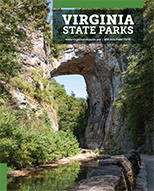Read Our Blogs
What does a Virginia State Park Interpretive Ranger do?
When you hear the word interpreter, most people connect it to translating one language to another. That is similar to what our rangers do as they translate the stories and history of the land and wildlife to the general public. By studying the park’s historical, natural and cultural resources, interpretive rangers are able to better connect guests to Virginia’s beautiful landscape and the animals that call the park home.
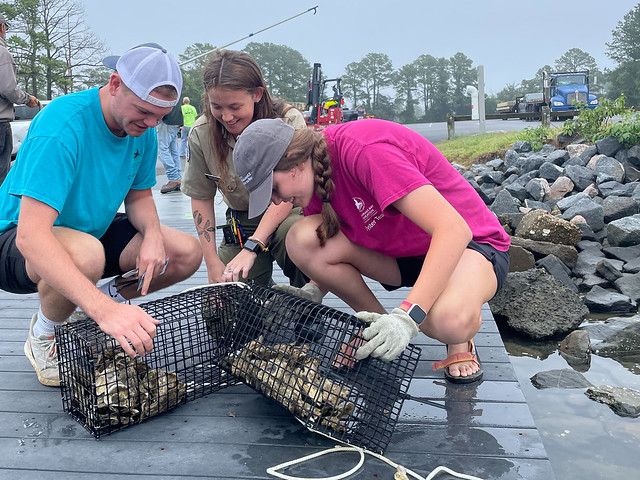
If you are an outdoor enthusiast who can teach others how to build their skillsets and can lead a kayaking or hiking program, then this job is suited for you. People do well in this position when they have a passion for education, can lead current programs and come up with new ones and those who have great customer service skills.
I spoke with several interpretive rangers and want to share some quotes with you as they better explain what their job is and why they love it so much.
What is a typical day like?
This is certainly a trick question to many employees as they will tell you that each day is a different adventure. Working in a park and interacting with the public can be fun and challenging so its very helpful to stay flexible, be willing to work hard and have a positive attitude.

“I like that I have the flexibility to organize my time between checking email, working on a program, cleaning the bathrooms and attending a training,” said York River State Park Interpretive Ranger John Gresham. “I enjoy the time I get to spend walking a trail, researching some history, planning and building an exhibit or presenting information to guests. I like being able to answer questions and help make the guest’s park experience a positive one.”
Summer months are the busiest for Virginia State Parks, but that doesn’t mean there isn’t work to do in the winter. Rangers enjoy the work that each season brings.
“A typical day varies depending on the season,” said a Powhatan State Park Interpretive Ranger. “During the busy summer season, I handle the morning prep, open the registers and make sure the visitor center is ready to open. I also check to be sure that we have what we need for the day, and everyone knows their assigned tasks. Then I'm either running programs, running the register and keeping everything organized. In the winter season I do the same things, but with less programs so now I have time to plan for the next summer season.”
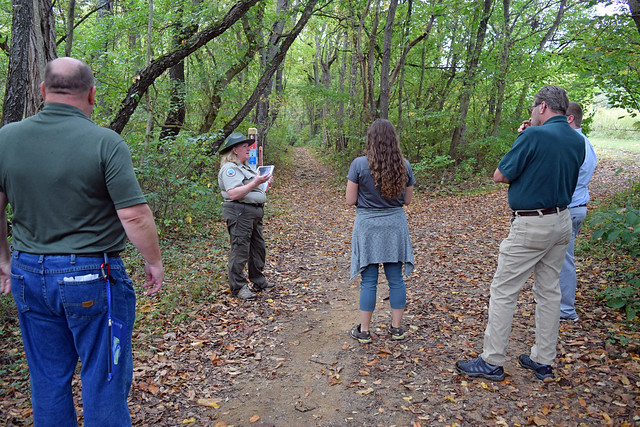
Being well educated about the park requires the rangers to explore and enjoy the area so they can help answer guests’ questions.
“I enjoy anytime I am with a guest, and I get to share something new with them, or learn from them,” said Sweet Run State Park Interpretive Ranger Meg Doppee. “I love being outside, but if I get stuck behind my desk and need a break, no one questions when I say I am going for a walk. It’s literally in my job description. Being outdoors is a big part of the job and I enjoy that very much.”
What skills are needed for this job?
An interpretive ranger’s working title is referred to as an education specialist and that means if you have any educational background this job might be something you should consider.
Skills needed for this job are strong written and verbal communications, creativity, knowledge and interest in flora, fauna and park history as well as having a background in customer service and/or teaching. Strong skills in public speaking, memorization, researching and planning are very helpful.
This job is fun and rewarding and while every interpretive ranger has a ton of skills in common, I spoke to rangers that have different educational backgrounds that led them to this job.
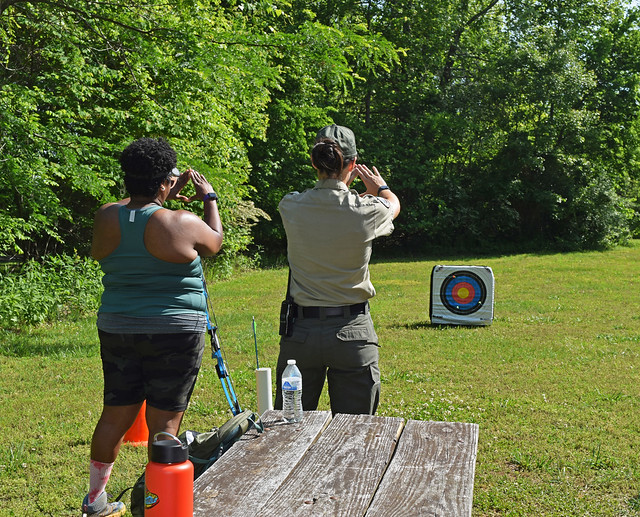
“I have worked in education my entire career,” said Sweet Run State Park Interpretive Ranger Meg Doppee. “Everything I learned in school and since, has been beneficial to what I do here at the parks, from learning strategies to exhibit design. But there is always so much more to learn, as technology and research is evolving rapidly. Having the ability to communicate with a diverse group of people and being able to work with a team or individually will help you be successful in this position.”
Rachel Howell is the interpretive ranger at Belle Isle State Park and her educational background is in environmental science.
“My degree and previous jobs, such as dog trainer and daycare teacher along with my experience as interpretive ranger at a Colorado State Park, have all provided teaching, planning, organizing, and scheduling skills that have been useful to me inside and outside of the workforce,” said Howell. “If you are passionate about making a difference, want to help people and nature, and enjoy working outdoors with the public then you should consider this type of job.”

Caylie Sims is an interpretive ranger at Leesylvania State Park and she found her career path into the park system through the AmeriCorps Program. After her service in that program ended, she knew that she wanted to work in a Virginia State Park.
“I helped build 2 miles of trail at Hungry Mother State Park during my time as an AmeriCorps member, and then helped lead a canoe tour for Widewater State Park while opening their accessible canoe/kayak launch,” said Sims. “I love educating people and talking to others that have a similar love of nature, so I knew I wanted to make a career of this.”
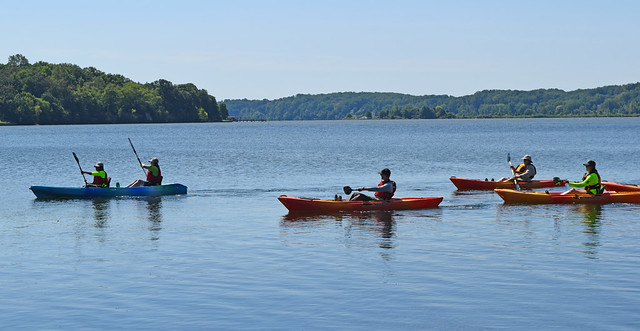
Being outdoors and working with the public is a major part of the job so if you are outgoing, friendly and willing to learn then consider applying for this job.
“My favorite part of the job is that I get to do a lot of fun stuff,” said Sims. “Interpreters are considered the fun rangers, so I get to go out and talk to people, go on hikes, take people canoeing and talk about the wildlife.”
How to apply for jobs at a Virginia State Park
The biggest misconception when it comes to applying for jobs is that you should only apply for jobs that you are one hundred percent qualified for. Unfortunately, this will lead to many missed opportunities. A strong work ethic, willingness to learn and a passion for nature is a great starting point for this type of career as a lot of what you will be doing can be learned on the job if you are willing to try.
According to a James River State Park interpretive ranger, “Everyone wants to be a ranger! It is the best of all worlds. Being outside and inside, dreaming of ways to tell the story of the park, and then sharing that story with others is the perfect job.”
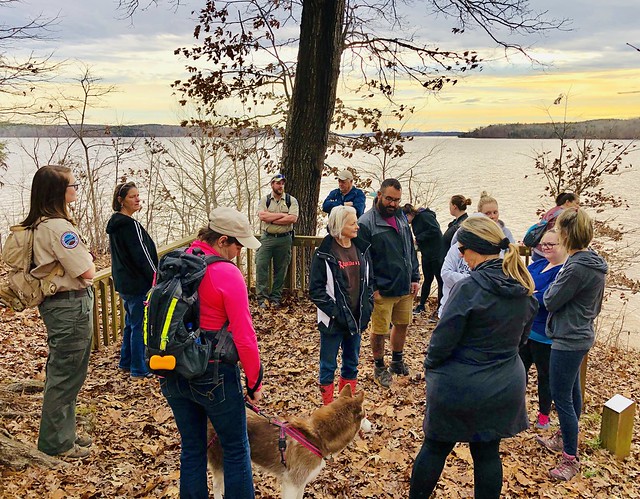
The most famous question that these rangers get is—"what languages do you speak?” Sweet Run State Park Interpretive Ranger Meg Doppee has the perfect response.
“I explain that a Virginia State Park interpretive ranger is a storyteller for the park", explained Doppee. “Someone who knows, and continues to learn about the park, it’s history and about the natural resources it provides. Interpreters don’t simply toss out facts, though we do use them, it’s how we use those facts to create a picture that puts the guest in the middle of it, and makes them wonder how they fit in. I may not know the name of every tree in the park, but I do know how it is connected to us. Every rock, tree and abandoned artifact has its story. That is what a park interpreter is.”
Make a Virginia State Park your office this year and apply for a job through the online process. Jobs are posted weekly so be sure to keep checking the website for more opportunities.
View the full list of jobs by visiting the DCR jobs page (dcr.virginia.gov).
If you have read the article and have a question, please email nancy.heltman@dcr.virginia.gov.
Search for blogs
By Park
Categories
Cabins
Camping
Fishing
History and Culture
Other
Programs and Events
Trails
Volunteers
Water Fun
Archive
2026
2025
2024
2023
2022
2021
2020
2019
2018
2017
2016
2015
2014
2012





